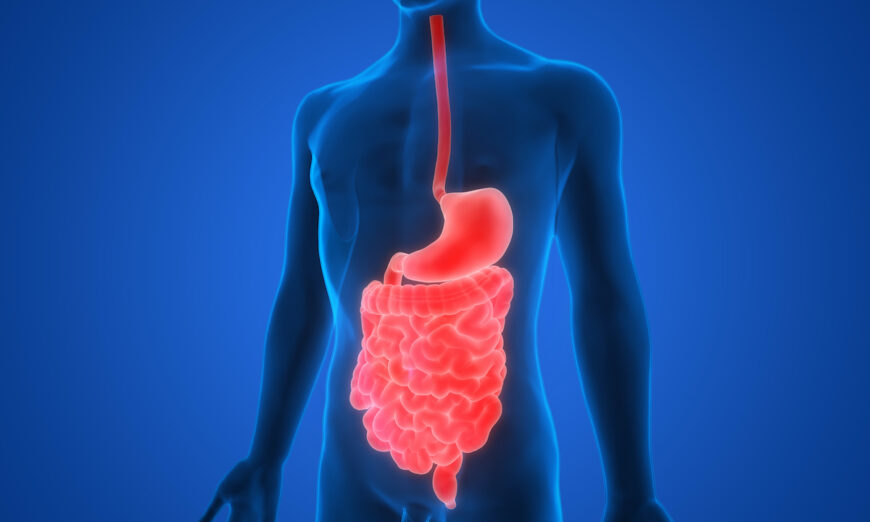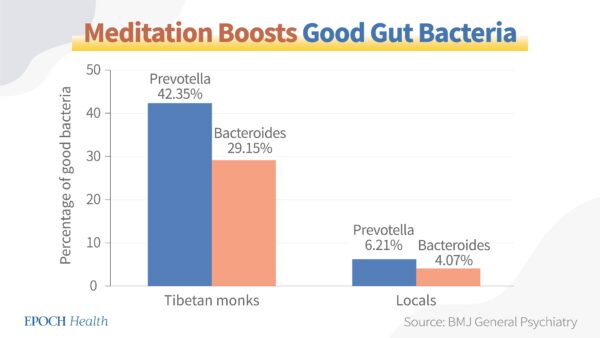
The gut is our main digestive organ and “second brain.” An imbalanced gut can negatively affect our body’s absorption of nutrients, blood sugar regulation, immunity, and even our mood. And there is a free method to help heal your gut: meditation.
Dr. Sunjya K. Schweig is an expert in complex chronic illnesses and a practitioner of integrative and functional medicine for almost three decades. According to his clinical experience, meditation can reduce stress, which in turn has a positive effect on the gut via several pathways. Very importantly, meditation can modulate the gut immune system and systemic inflammation, thus facilitating recovery from gut conditions.
Meditation Can Boost Good Gut Microbiome
A study recently published in BMJ General Psychiatry analyzed the gut microbiome compositions of 56 Tibetan Buddhist monks and some residents who don’t regularly meditate.
Researchers discovered that the monks’ long-term deep meditation practice had significantly enriched the good bacteria in their intestinal systems, yielding “a reduced risk of anxiety, depression, and cardiovascular disease.”

Specifically, the proportions of good bacteria Prevotella and Bacteroides among the Tibetan monks were 42.35 percent and 29.15 percent, respectively, whereas their proportions were 6.21 percent and 4.07 percent in the locals. The monks also had a larger quantity of the good gut bacteria of Megamonas and Faecalibacterium than the local residents.
Stress and depression facilitate dysbiosis of the gut microbiota, and meditation can reduce stress and the risk of depression, in turn promoting a better gut microbiome.
Additionally, per a meta-analysis, meditation can help regulate the stress response and maintain a healthy gut-barrier function. The researchers recommended integrating meditation into existing health care models for improved effects.
Scientists also recommend using meditation as an effective tool in regulating gut health, as meditation could significantly improve the gastrointestinal quality of life index (GIQLI).
Furthermore, according to a Harvard blog, meditation can activate the parasympathetic nervous system, which in turn promotes gut motility.
When gastrointestinal motility is slow, bacteria and yeast cannot be removed from the body on time, leading to a build-up of bacteria and/or yeast in the small intestines, called small intestinal bacterial overgrowth (SIBO). SIBO can lead to chronic diarrhea and malabsorption of nutrients, causing depletion of certain fat-soluble vitamins such as A, D, E, and K.
Meditation Can Improve Gut Diseases and Other Digestive Diseases
When suffering from stress, our digestive system simply cannot function well, according to Dr. Tawny Kross, a pain specialist and physical therapist at Kross Centered Care who specializes in chronic pain.
Due to significant lifestyle changes in recent decades, the number of people with gastrointestinal disorders worldwide has been on the rise. According to the National Institute of Diabetes and Digestive and Kidney Diseases, 60 to 70 million Americans are affected by digestive diseases. Nevertheless, meditation can be an effective tool in relieving several common gut and other digestive diseases.
Kross discovered in her practice that when the issue of stress is addressed by interventions such as meditation, her clients’ gut health would improve drastically. “When mindfulness (meditation) is combined with dietary changes, there is also a more powerful and greater impact,” she said.
Oftentimes patients with gastrointestinal symptoms improve when they engage in a meditation program, “because meditation has been shown to decrease stress levels,” and it also alters their nervous system, thus changing their gut for the better, according to Dr. Daniel A. Monti, chair of the Department of Integrative Medicine & Nutritional Sciences at Thomas Jefferson University and CEO of Marcus Institute of Integrative Health.
Irritable Bowel Syndrome (IBS)
One of Kross’ clients suffered from stomach pain and IBS symptoms for over a decade, but after he started practicing meditation, his stomach pain and IBS soon improved.
And combined with the proper nutrition, he started having regular bowel movements, and his gut issues later disappeared.
Irritable bowel syndrome is a disorder of gut-brain interaction and a group of symptoms, including abdominal pain, bloating, diarrhea, and constipation. Ten to 15 percent of American adults suffer from IBS symptoms.
According to Dr. Kenneth Brown, a gastroenterologist, recent research showed that the practice of meditation can reduce IBS symptoms and the amount of time patients spend in the bathroom with digestive issues. Meditation can also decrease patients’ stress and anxiety levels, while the amount of serotonin in their bodies increases. Serotonin is a key hormone in regulating our digestive systems.
In a study published in the American Journal of Gastroenterology, 75 female IBS patients were randomly assigned to eight weekly half-day meditation sessions. The patients who participated in these sessions experienced a substantial reduction in IBS symptom severity and distress, as well as improved quality of life.
In addition, such beneficial therapeutic effects lasted for at least three months after the sessions.
In a different follow-up study, 10 IBS patients who had been practicing relaxation response meditation for one year experienced significant reductions in IBS symptoms in comparison with their pretreatment conditions, including abdominal pain, diarrhea, flatulence, and bloating. The researchers suggested that continued use of meditation is an effective treatment for IBS in the long term.
Crohn’s Disease
Crohn’s disease is a type of inflammatory bowel disease that causes inflammation of the digestive tract. Its major symptoms include abdominal pain, severe diarrhea, fever, fatigue, bowel obstruction, and weight loss. Patients with Crohn’s disease are at a higher risk of colon cancer.
Evidence shows that meditation can support Crohn’s disease patients’ subjective well-being homeostasis, which is the systematic management of positive feelings about ourselves. This may be due to meditation’s ability to help patients regulate their emotions.
In another 2022 German study, patients with Crohn’s disease were randomly assigned to two groups. One group received one weekly six-hour meditation session for 10 weeks. The study participants then took questionnaires on inflammatory bowel disease symptoms at week 12, and then at week 36.
The patients who participated in the meditation sessions regularly were later extremely satisfied with their experience. At the end of the study, the researchers recommended meditation as a comprehensive approach to Crohn’s disease patients’ treatment.
Gastroesophageal Reflux Disease (GERD)
GERD is a type of upper gastrointestinal disease, where stomach acid regularly flows up into the esophagus. Its main symptoms include heartburn, difficulty swallowing, painful swallowing, and noncardiac chest pain.
Symptoms of GERD can be exacerbated by stress and depression, and meditation can help reduce both, thus positively improving GERD symptoms. In a longitudinal study in the official publication of the Indian Society of Gastroenterology, the group of participants who practiced meditation showed a greater decrease in their levels of depression than the controls. As a result, the researchers perceive meditation as an effective therapy for GERD patients.
Chronic Gastritis
Gastritis is an inflammation, irritation, or erosion of the lining of the stomach. Its symptoms may include upper abdominal pain, nausea, vomiting, bloating, and heartburn.
In a 2021 study, 146 chronic gastritis and gastric ulcer patients were assigned to two groups. One group received the standardized nursing intervention, while the other group received meditation training on top of the standardized care. The analysis showed that the nursing efficacy rate, nursing satisfaction rate, and general self-efficacy scale score of the group that meditated were higher.
Moreover, the first group’s self-rating anxiety and depressive scale scores were lower. The researchers concluded that the combination of standardized nursing intervention and meditation had curative effects on these patients.
Meditation Provides Pain Relief
Monti says meditation can offer pain relief to patients with digestive diseases, as well.
Since meditation can calm the sympathetic nervous system, according to the Harvard blog, it can reduce chronic pain, since the sympathetic nervous system tends to exacerbate physical symptoms of diseases such as pain. Therefore, meditation can be used as an effective and safe tool for pain control.
Patients with digestive diseases, including celiac disease, inflammatory bowel diseases, hemorrhoids, and anal fissures can benefit from the pain relief offered by meditation.
‘No Side Effects’
Pharmaceuticals can be necessary for treating gut diseases, but inevitably, they also bring side effects. Meditation can be a good alternative treatment to incorporate.
“Often, meditation can reduce the need for medication, allowing the patient more natural relief without the side effects of pharmaceutical drugs,” Dr. Sony Sherpa, a holistic physician from organic wellness company Nature’s Rise, said.
It also doesn’t interfere with or offset the effects of medication. Paul Harrison, a corporate personal meditation coach based in Ontario, Canada, concurred. “There’s really no evidence to suggest that meditation will interfere with any kind of medication or with any other (medical) intervention.”
Other Ways to Maintain a Healthy Gut
In addition to meditation, there are many other ways to keep a healthy gastrointestinal system.
For example, maintaining a balanced diet with lots of fiber is important to our gut health. We need to consume 25 to 35 grams of fiber per day, and they can be from whole grains, fruits, vegetables, legumes, and nuts. To help our body better digest fiber and other nutrients, we also need to drink an adequate amount of water, which is four to six cups of water per day for most people.
We also need to work out regularly to supply more blood flow to the gut.
And finally, the intake of probiotic foods such as yogurt, sauerkraut (shredded fermented cabbages), kimchi (Korean-style fermented vegetables), miso (Japanese-style seasoning made with fermented soybeans), kombucha (fermented black or green tea), pickles, sourdough bread, and certain cheeses can also help with the health of our gut microbiota.